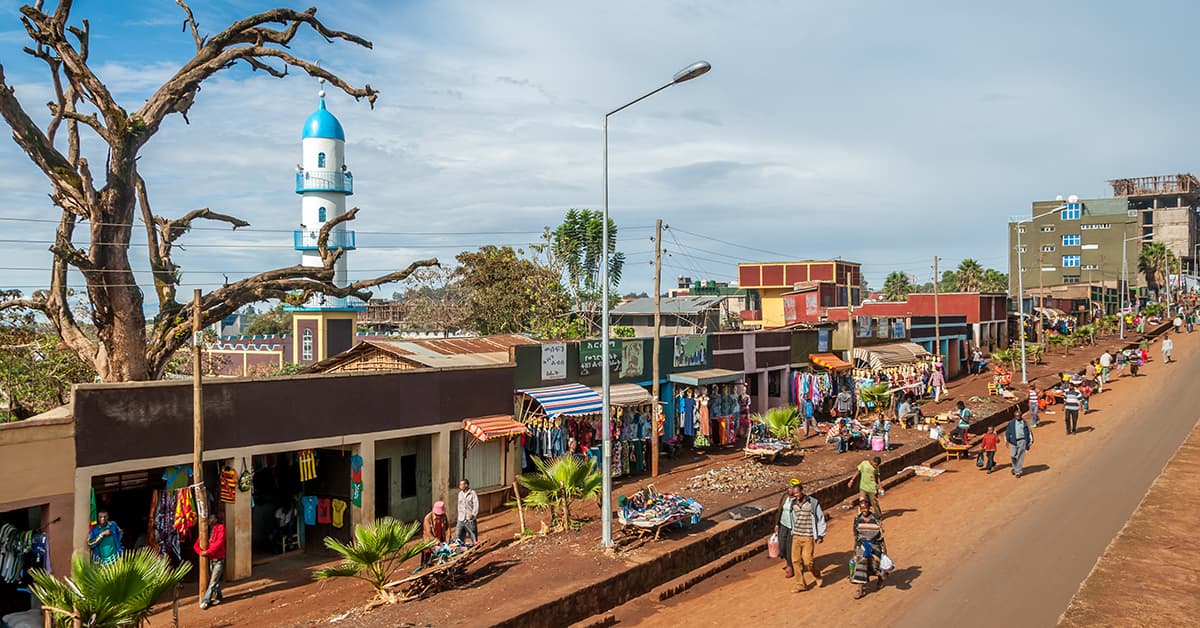Can Ethiopia recapture the magic of its recent fast-growth decade? First it needs to emerge from Covid-19, then to reassure foreign investors.

|
ETHIOPIA: VITAL STATISTICS |
|---|
|
Location: East Africa |
|
Neighbors: Eritrea, Kenya, Somalia, South Sudan, Sudan |
|
Capital city: Addis Ababa |
|
Population (2019): 112,078,370 |
|
Official language: Amharic |
|
GDP per capita (2019): $857.50 |
|
GDP growth (2019): 8.3% |
|
Inflation (2019): 15.8% |
|
Currency: Birr |
|
Investment promotion agency: Ethiopian Investment Commission |
|
Investment incentives available: Breaks on income and customs taxes; export incentives |
|
Ease of Doing Business rank (2019): 159 |
|
Corruption Perceptions Index rank (2019): 96 |
|
Political risks: High level of political risk; election postponed until 2021 |
|
Security risks: Apart from Covid-19, several areas are very unsafe for travel, especially border areas, due to unexploded land mines and danger of kidnapping |
|
PROS |
|---|
|
Government recognizes need for FDI |
|
CONS |
|---|
|
Economic risk; currency and political instability |
|
Droughts, locusts |
|
Unknown total reduction in domestic demand due to Covid-19 |
|
High inflation |
|
Sources: AM Best, Government of Canada Global Travel Advisory, International Monetary Fund, Reuters, Risk and Compliance, Portal, Transparency International, US State Department, World Bank |
|
For more information, check out Global Finance‘s Ethopia Economic Report data page. |
Ethiopia built an impressive record as a frontier markets overperformer in the past decade. Growth ranged between 8.3% and 11.2% for all but one year between 2011 and 2019, according to the World Bank.
Government spending on infrastructure, agricultural exports and low-cost manufacturing drove growth, says Corti Paul Lakuma, macroeconomist and research fellow at Uganda’s Economic Policy Research Center in Kampala. The country’s natural resources, including gold, have also been a strong attraction.
Foreign companies such as Diageo, Heineken Breweries, Toyota, General Electric and Hilton Worldwide are established in Ethiopia. Chinese companies came to develop mining operations. Today, over 90% of the companies in Ethiopia’s industrial parks are foreign owned, says Alemayehu Geda, professor of economics and macroeconomics at Addis Adaba University.
But over the past year, the Covid-19 crisis, and the outbreak of civil war in the state’s northern province, threw the durability of this progress into doubt. The government had expected 9% growth for the fiscal year ended July, but since revised that down to 6%—which Geda says may still be inaccurate. For the current fiscal year, Gede pegs growth at 2.8%. The IMF forecasts zero growth.
Ethiopia’s dynamism had slowed even before the pandemic. Net inflows of foreign direct investment shot up to $4.1 billion in 2016 but fell approximately 38% to $2.5 billion in 2019.
The government of Prime Minister Abiy Ahmed looks to FDI to stimulate the underdeveloped private sector. Opportunities include infrastructure, telecommunications and telecommunications-related services, and labor-intensive exports such as low-cost manufacturing. Working around the fact that the country is landlocked, Ethiopia has invested in ports in Somalia and is considering developing ports in Djibouti as well, Gede notes.
Companies looking to exploit those opportunities will have challenges apart from waiting for the pandemic crisis to abate. Topping the list is the civil war that recently erupted between the central government and the leadership of the northern province of Tigray. “There was political instability before the pandemic,” says Gede.
The economic damage within Ethiopia may become serious, according to Moody’s Investors Service. The ratings agency warns that ongoing conflict could unravel economic and social progress at a time when “weak revenues and elevated external vulnerability as a result of the global coronavirus are already pressuring creditworthiness.”
Corruption also looms large for would-be investors. While the constitution guarantees judicial independence, judges are vulnerable to influence by high-level officials, according to an analysis posted on GAN Integrity’s Risk & Compliance Portal.
In addition, the judicial system is poorly staffed. Business also say they do not have full confidence in the police.
However, fewer than one in 10 companies indicates that the court system is a major constraint on their ability to do business.



